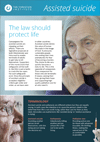It is “dangerous” for the Royal College of Nursing (RCN) to adopt a neutral stance on assisted suicide, says a leading Peer.
Baroness Audrey Emerton, who is a fellow of the RCN questioned its recent claim to neutrality in light of news that it plans to engage in talks with MSP Margo MacDonald, who is behind the push to legalise assisted suicide in Scotland.
She also points out that the policy change from opposed to neutral was based on consultation responses from just 0.3 per cent of the membership. And of those, 40 per cent were opposed to the idea.
“To base a serious shift in the college’s stance on the opinions of 0.3 per cent of the membership is nothing short of irresponsible”, the Baroness said.
Lady Emerton expressed outrage at the suggestion by the RCN’s general secretary that a neutral stance would enable nurses “to engage in dialogue” with their patients on assisted suicide.
She said: “Let us put the spin aside and be clear what this means. Encouraging or assisting suicides is a criminal offence in this country, as it is in most others.
“Were a nurse to be convicted of such an offence, that would of course put into question his or her fitness to practise.
“Some people may not find this position to their liking, but we simply cannot have nurses — or anyone else for that matter — engaging in ‘dialogue’ about something that is against the law. For the RCN Council to imply anything different is, frankly, dangerous.”
She added: “The only dialogue on this subject that nurses can engage in with patients is to point out that assisting suicides is illegal and that they cannot have any part in it. Nurses are as bound by the law on not assisting suicides as is any other citizen and they should remember that.”
Lady Emerton points out that it is not uncommon for those who are involved in healthcare to have seriously sick patients ask for help dying, but, she claims these are invariably a cry for help or reasssurance rather than a serious request.
“Sometimes the underlying issue is not even their health but something like money or personal relationships”, she added.
Lady Emerton warns: “There is a possibility that the college is planning to go further on the issue of neutrality, by talking to the MSP Margo MacDonald about her proposals for legalising assisted suicide in Scotland.”
The Baroness continues: “We should all be concerned about these developments. I say this not only because I oppose the legalisation of assisted suicide, which I believe would put thousands of vulnerable sick people at risk of self-harm, but also because it looks very much as though the RCN Council is using a microscopic sample of nursing opinion to steer the college on to a politically controversial course.
“My experience of many years spent in the nursing profession tells me that the majority of nurses remain opposed to helping their patients to kill themselves and are more concerned with improving their healthcare.
“If the college is to convince its members that it is not using them for its own political purpose, it should carry out a far more searching consultation”, she added.
A proposal to legalise assisted suicide in England and Wales for those wishing to end their lives abroad was rejected in the House of Lords earlier this month.
A disabled Peer, Baroness Campbell of Surbiton, made a moving speech appealing to the House to reject the amendment, warning that many vulnerable patients would be at risk if the law was weakened.

